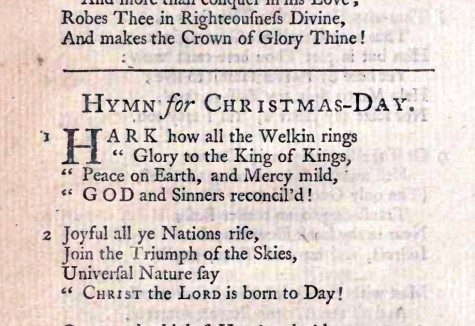“Hark how all the Welkin rings!” (Greatest Christmas Song II)
They had a volatile relationship, those three men. Charles and John Wesley, two brothers, and George Whitefield – all three, evangelists. The story of their relationship covered their lifetimes, and was no simple matter. Historians still argue about exactly what went wrong, what went right, and who was to blame.
They began early on as fast friends. And although their relationships had their serious issues, when Whitefield passed away Charles wrote a moving poem as a eulogy, and John preached at the funeral.
The (other) greatest Christmas song, like the story of Whitefield and the Wesleys, ended up mirroring the strange story of conflict and triumph. And it all begins with the first line.
It was first published in 1739, titled “Hymn for Christmas-Day”. At the time, both Whitefield and the Wesleys were involved in a growing revival. Whitefield had been preaching in the open air, after he found that few churches would allow him to preach in their pulpits. The Wesleys were just starting to follow his example. Whitefield then left England for the American colonies, leaving the new believers he had ministered to in the care of the Wesley brothers.
It was a busy time. The Wesleys were busy publishing a new hymnal, “Hymns and Sacred Poems”. Hymn for Christmas-Day was part of the collection, the words written by Charles Wesley. Wesley apparently used the same tune for this song as for “Christ the Lord is Risen Today”.
The first two stanzas (today sung as one) were as follows:
Hark how all the Welkin rings
“Glory to the Kings of Kings,
“Peace on Earth, and Mercy mild,
“GOD and Sinners reconcil’d!
Joyful all ye Nations rise,
Join the Triumph of the Skies,
Universal Nature say
“Christ the Lord is born to Day!

You might recognize the song, but my, how it has changed! And what is a “Welkin”? Welkin, a word that is perfectly proper today and still used in modern English (though rarely) means heaven – in other words, the heavens are ringing with the message of the angels.
George Whitefield took the song and changed a few words for his new hymnbook A Collection of Hymns for Social Worship – and here comes the controversy! It was 14 years later. Here are the new words:
Hark! the Herald Angels sing
Glory to the new-born King!
Peace on Earth, and Mercy mild,
God and Sinners reconcil’d.
Joyful all ye Nations rise,
Join the Triumphs of the Skies;
Nature rise and worship him,
Who is born at Bethlehem.
Well, we can see that this version is going to catch on a little better (although it’s still in for some changes). But there’s a problem. In the Bible record, the welkin certainly does ring with angel’s voices. But nowhere does the Bible tell us that the angels sang.
Now for poetry and song, I have no problem with a loose artistic use of the word “sing”. What the angels said certainly was poetic and proclaimed, so to translate that as “singing” needn’t be a theological stumbling block. As long as we realize that they may not have technically “sung”.
However, Charles Wesley was not a fan of people changing the words of his hymns, which it seems that Whitefield did without permission (although we’re not sure).
Today. you may be familiar with the modern version, very similar to Whitefield’s version:
Hark! The herald angels sing,
“Glory to the newborn King;
Peace on earth, and mercy mild,
God and sinners reconciled!”
Joyful, all ye nations rise,
Join the triumph of the skies;
With th’angelic host proclaim,
“Christ is born in Bethlehem!”
Whichever version you prefer, this stanza is an introduction to our worship of Christ. The angels take the lead, and the nations rise to join in the praise. Peace on earth, and mercy mild! What does it all mean? That will be explained in the stanzas to come.
As the Sons of Korah wrote:
I will cause your name to be remembered in all generations;
Psalm 45:17
therefore nations will praise you forever and ever!

“…to all Thyself impart” (Greatest Christmas Song II) – Finding direction
17 December 2019 @ 6:03 pm
[…] we talked about back at the beginning, this carol originally had four line stanzas, sung to the tune of “Christ the Lord is Risen […]
The Greatest Christmas Song II (index/resources) – Finding direction
26 December 2019 @ 7:07 pm
[…] “Hark how all the Welkin rings!†[…]